In the current digital epoch, as the cyberspace domain undergoes rapid evolution, the choice of an appropriate hosting platform can play a critical role in the success of our digital footprint. It is with this understanding that I undertook an in-depth examination of Cloudways Autonomous, a platform that promises to revolutionize the cloud hosting sphere. Herein lies my analysis.
A revolutionary hosting paradigm
Cloudways Autonomous stands as a hosting platform built upon Kubernetes (GKE) infrastructure, which automatically scales in response to website traffic fluctuations, obviating the need for human intervention. Its advanced load-balancing capabilities ensure applications remain accessible online, irrespective of demand levels. This solution is particularly adept for WordPress sites, offering not only unparalleled performance but also enterprise-level security through integration with Cloudflare Enterprise.
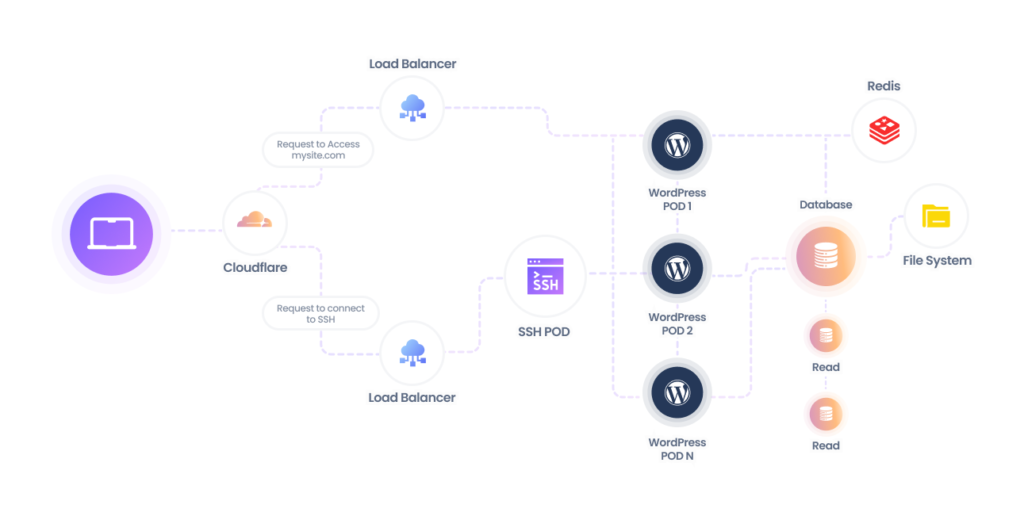
What sets Cloudways Autonomous apart from its competitors are the advanced features accessible to both seasoned developers and those new to the realm of hosting. The platform boasts an extensive array of tools and configuration options, allowing for customization to meet individual user needs, regardless of project scale.
Key distinctions from traditional web hosting include:
Automated Scaling: The platform effortlessly handles any surge in traffic and concurrent user volume from the outset, eliminating the need for manual adjustment.
High Availability: Sophisticated load balancing ensures that applications remain accessible online, regardless of demand fluctuations.
Seamless User Experience: The server is completely abstracted, freeing users from having to concern themselves with server sizes, let alone their management and optimization.
Downtime Elimination: The platform dynamically adjusts to your business in real-time, offering peace of mind and the ability to focus on core tasks.

One of the hallmark advantages of Cloudways Autonomous is the seamless user experience it provides. From an intuitive interface to effortless resource management, this platform delivers a level of operational fluidity and efficiency often missing from traditional hosting solutions. This ensures that even individuals without a technical background can effectively manage their online presence.
The mechanics of autoscaling
Autoscaling within Cloudways Autonomous harnesses the power of Kubernetes to dynamically adjust resources based on current demand. Instead of relying on a single server, website is distributed across multiple containers (known as pods), which can be automatically scaled horizontally (up and down) in response to traffic fluctuations.
The system automatically launches additional containers as traffic increases and scales them down as traffic decreases, optimizing resource utilization. This ensures that your application always has access to the necessary amount of resources for smooth and stable operation, without downtime or slowdowns, even during unexpected traffic spikes.
How Autonomous guarantees high performance?
A pivotal feature ensuring high performance within Cloudways Autonomous is the provision of unlimited PHP Workers. This functionality is crucial for handling numerous concurrent requests, essential for the optimal performance of high-traffic websites. With unlimited PHP Workers, your site can accommodate more users and processes simultaneously, eliminating slowdowns or downtime.
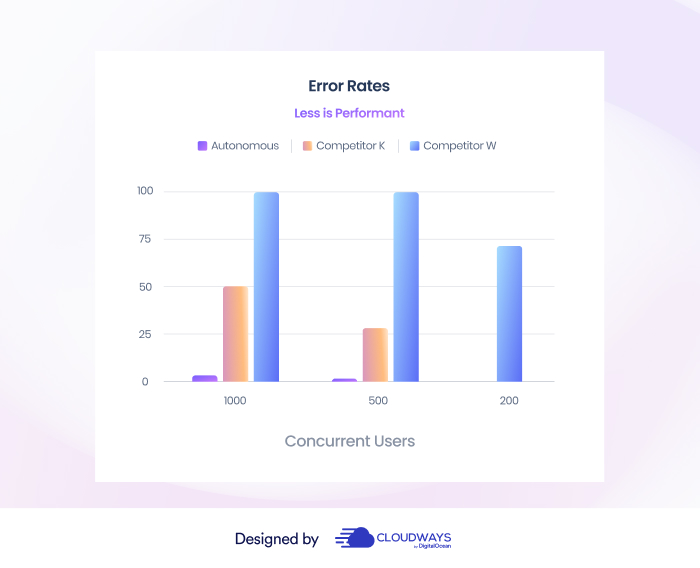
Moreover, Cloudways Autonomous leverages integrated Cloudflare Enterprise, not only accelerating page loading times through its global CDN network but also enhancing security. Traffic filtration at the network edge minimizes the risk of DDoS attacks and other threats, ensuring your site remains secure and accessible to users worldwide.
The incorporation of Integrated Object Cache Pro distinguishes Cloudways Autonomous further. It enhances WordPress performance by speeding up page loads and ensuring the smooth operation of the WordPress admin area. This feature allows even the most resource-intensive sites to operate swiftly and reliably.
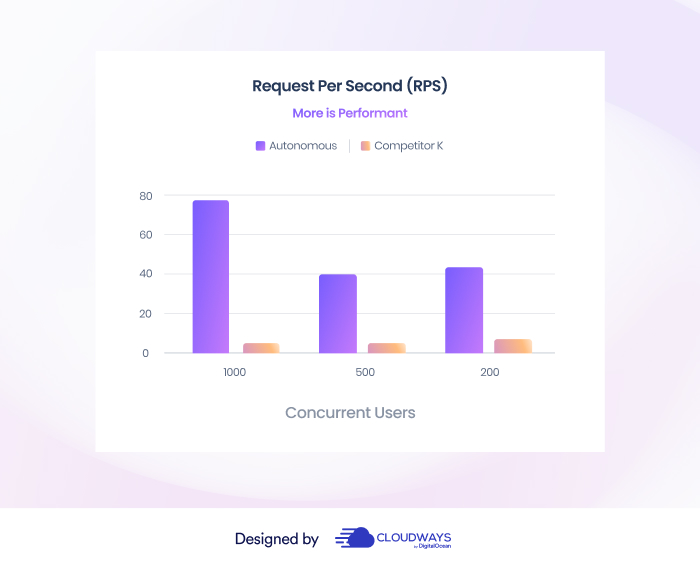
These integrated mechanisms significantly impact the high performance and scalability of Cloudways Autonomous, as evidenced by the service provider’s performance charts. This combination of features not only facilitates impressive performance levels but also scales efficiently to meet demand, showcasing Cloudways Autonomous as a leading solution in cloud hosting technology.
Pricing and Packages
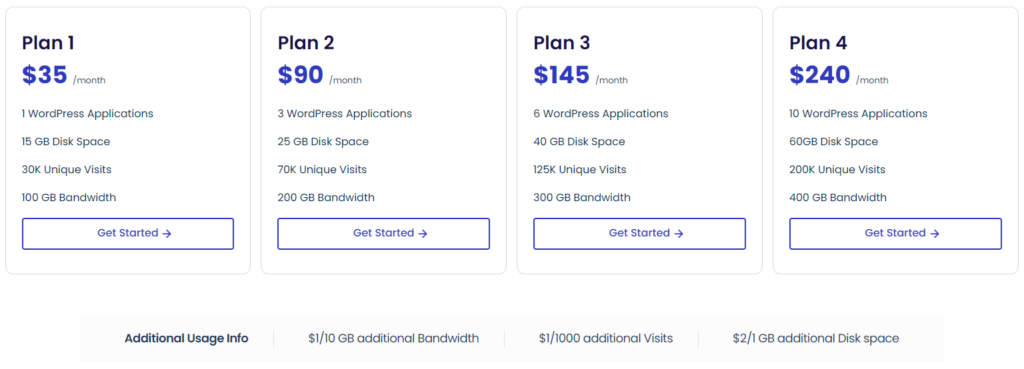
Cloudways Autonomous offers a variety of packages tailored to business needs of all sizes. There are a total of seven packages; however, it’s noteworthy that the last three are primarily aimed at agencies or individuals managing their clients’ websites. The individual packages are:
- Plan 1: Priced at $35 per month, it allows for hosting 1 WordPress site with 15 GB of disk space. Traffic is limited based on the number of unique visitors and data transfer – these are respectively 30K unique visitors (UU) and 100 GB of data transfer.
- Plan 2: Aimed at individuals with 3 WP installations, costing $90 per month. It provides 25 GB of disk space and supports 70k unique visitors per month (with 100GB of data transfer).
- Plan 3: Designed for those with up to 6 WordPress sites, it can support up to 125k unique visitors per month or up to 300GB of data transfer. This plan allocates 40GB of disk space for the sites.
- Plan 4, which we consider the last one aimed at regular users, supports 10 WP installations within 60GB of disk space. The sites can accommodate up to 200k unique visitors monthly.
Each package also includes add-ons for:
- expanding disk space at $2 per 1GB of disk,
- an additional pool of unique visitors at $1 per 1000 UU,
- and data transfer extension at $1 for every additional 10GB.
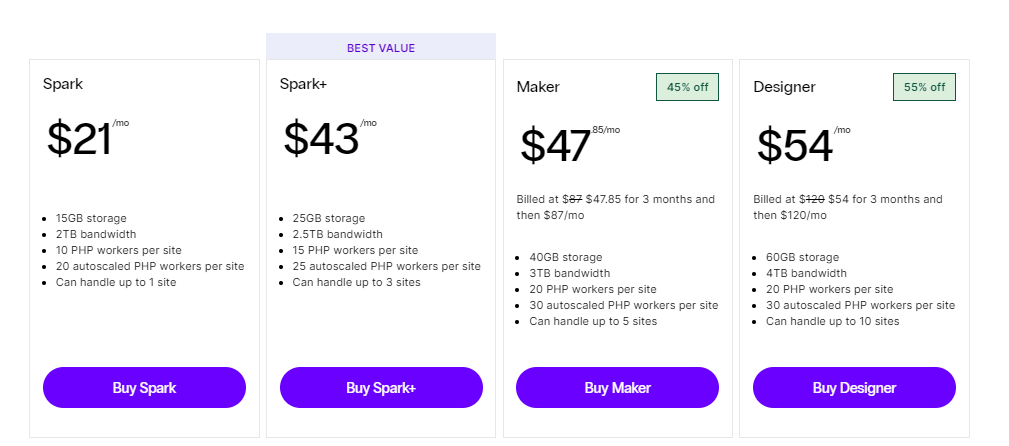
I also looked at Nexcess’s offer, which explicitly states on its website that it’s an alternative to Cloudways. The packages are very similar, except Nexcess clearly informs about the PHP worker limits (there’s no illusion of infinity). For similar packages, the prices are:
- Spark: $21 per month for 15GB of disk, 1 WordPress installation, and 2TB of data transfer.
- Spark+: $43 per month offering 25GB of disk, 3 WP installations, and 2.5TB of data transfer.
- Maker: A package allowing for 5 WordPress installations at $47.85 per month, limited by 3TB of data transfer and 40GB of disk space.
- Designer: The last equivalent provides support for 10 WP installations, 4TB of data transfer, and 50GB of disk space at $54 per month.
Nexcess also offers a bonus of free WordPress migration, where our main topic, Cloudways, offers migration of only 1 site. The cost of migrating each additional site is $25.
Thus, it seems that the competition offers more possibilities at competitive prices. The fact of free migrations will be especially appreciated by beginners – what’s the point of Autonomous providing an app for automatic migration if clients are usually cautious and prefer to leave such operations for their sites to professionals and providers.
I’m also looking through the lens of visit limitation. Setting a hard limit on unique visitors openly forces a change to a higher-tier service. It’s cheaper to pay for a higher package than to buy additional bundles of data transfer and UU, which is important if you have 1 site with high traffic. A cash grab? Perhaps to some extent. But such are the charms of services with “unlimited” in their concept.
In summary
Cloudways Autonomous platform emerges as an innovative solution in the cloud hosting landscape, impressively blending cutting-edge technology with practical hosting functionalities. The platform’s use of Kubernetes for autoscaling, its provision of unlimited PHP Workers, and integration with Cloudflare Enterprise, collectively spotlight a forward-thinking approach to meeting the dynamic needs of modern websites. This technological prowess not only underscores the cool factor of Cloudways Autonomous but also its commitment to performance and scalability.
However, when it comes to pricing, Cloudways Autonomous positions itself on the higher end of the spectrum. While the initial offerings are attractive for their advanced features, the reality that users will likely need to avail themselves of additional services—such as expanded unique visitor limits—points to a potentially significant increase in costs. This consideration is crucial for businesses mapping out their online strategy and budget, especially when growth and scalability are in their sights.
It’s also worth noting that services offered by competitors, such as Nexcess, present compelling alternatives. These alternatives often come with more transparent limitations around resources like PHP workers and offer competitive features at more accessible price points. Notably, the value proposition of free site migrations offered by competitors contrasts sharply with Cloudways Autonomous, which limits customers to a single free migration, with each subsequent migration incurring a fee. This could be a deterrent for potential users who are looking for seamless transitions without additional costs.
Kamil Kołosowski
Author of this post.
